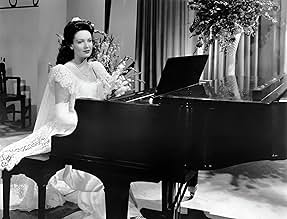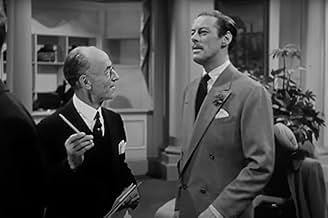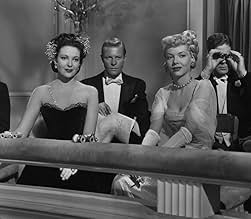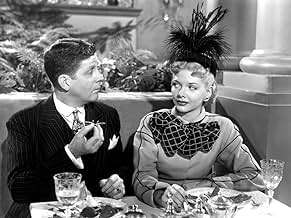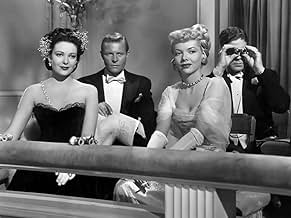CALIFICACIÓN DE IMDb
7.4/10
6.1 k
TU CALIFICACIÓN
Agrega una trama en tu idiomaA man dreams of revenge when he suspects his wife is unfaithful.A man dreams of revenge when he suspects his wife is unfaithful.A man dreams of revenge when he suspects his wife is unfaithful.
- Dirección
- Guionista
- Elenco
- Premios
- 1 premio ganado en total
Al Bridge
- House Detective
- (as Alan Bridge)
Abdullah Abbas
- Concert Attendee
- (sin créditos)
Pati Behrs
- Minor Role
- (sin créditos)
George Beranger
- Maître d'hôtel
- (sin créditos)
Evelyn Beresford
- Madame Pompadour
- (sin créditos)
Georgia Caine
- Dowager in Concert Box
- (sin créditos)
James Carlisle
- Concert Attendee
- (sin créditos)
Harry Carter
- Reporter
- (sin créditos)
Bill Cartledge
- Page Boy
- (sin créditos)
- Dirección
- Guionista
- Todo el elenco y el equipo
- Producción, taquilla y más en IMDbPro
Opiniones destacadas
I was surprised to see only one comment on this film in your files. It's been one of my all-time favorites since I was a youngster about the time it was made. Now that I'm reminded by looking it up here that it was a Preston Sturges film I can see why that's so. His classic comedies were unique. It must be also one of Rex Harrison's greatest films. Being a professional musician myself I can especially appreciate the symphonic ambience in which it takes place. I can also appreciate the possible parody Sturges might have had in mind of the great British conductor of those days, Sir Thomas Beecham. The greatest and most memorable visual effect of the movie (I've certainly remembered it all these years most vividly) happened when the Harrison character has to look up the directions for using the recording machine on which he was going to fake the evidence of his wife's still being alive. Onto the screen flashes the most outrageously complex electrical diagram comprehensible only to a professional electrician. This symbolized the inability of modern man to cope with advanced technology. One of the most hilarious moments in film I've ever seen. More viewers should catch up with this one.
Noted film critic Leonard Maltin comments "oozing with sophistication" and he's absolutely right.It's a brilliant film for grown-ups (or, at least, grown ups of the 40's).It would probably frighten or confuse todays audiences because the dialogue is so rich it would send them running to the dictionary every other minute.The casting is perfect with many of Sturges' favorite supporting players delivering beautifully.If you're over 50 (and/or have a college degree) you'll love this film.If you're into rock and roll and four letter words this film would be your worst nightmare.
Unfaithfully Yours (1948)
I've never quite loved Preston Sturges as a director or Rex Harrison as an actor, so having the two of them together here didn't bode well, and I thought I'd announce my bias. And sure enough, on this second viewing I was reminded of a kind of crisp calculation that both of them have. Sturges makes amazing movies, no question, and the best of them (Palm Beach Story is my favorite) are hilarious classics. To see this one for what it offers you might first see a classic Sturges screwball from 1941 or 1942. But even those are clinical at heart (if they have a heart), so it's a little like sipping a very dry, clean martini and getting drunk. Alone. No olives. Wit and sophistication do better in the hands of Cole Porter, somehow, but see for yourself.
Harrison the actor overcomes his harsh demeanor in a movie like My Fair Lady because the music and the style there give him some kind of liberty, but here he is supposed to be sympathetic in his demented cruelty, and I only wish him failure. He is, to be sure, plotting the death of his wife. Three times. And then the fourth, beyond the symphony podium, with its madcap bedlam. It's funny in that zany way you have to laugh at. And you will laugh.
I love classical music and like the structure of the film, but as usual with Sturges, this structure makes the whole process detached and too too clever. Sturges himself wrote the screenplay for this idea way back in 1932, and if it had been shot then, before the Hays code, before the real rise of screwball, we would have had a very different movie. But what we have here is admirable and interesting, for sure, if not the zinger it could have been with a different tilt.
I've never quite loved Preston Sturges as a director or Rex Harrison as an actor, so having the two of them together here didn't bode well, and I thought I'd announce my bias. And sure enough, on this second viewing I was reminded of a kind of crisp calculation that both of them have. Sturges makes amazing movies, no question, and the best of them (Palm Beach Story is my favorite) are hilarious classics. To see this one for what it offers you might first see a classic Sturges screwball from 1941 or 1942. But even those are clinical at heart (if they have a heart), so it's a little like sipping a very dry, clean martini and getting drunk. Alone. No olives. Wit and sophistication do better in the hands of Cole Porter, somehow, but see for yourself.
Harrison the actor overcomes his harsh demeanor in a movie like My Fair Lady because the music and the style there give him some kind of liberty, but here he is supposed to be sympathetic in his demented cruelty, and I only wish him failure. He is, to be sure, plotting the death of his wife. Three times. And then the fourth, beyond the symphony podium, with its madcap bedlam. It's funny in that zany way you have to laugh at. And you will laugh.
I love classical music and like the structure of the film, but as usual with Sturges, this structure makes the whole process detached and too too clever. Sturges himself wrote the screenplay for this idea way back in 1932, and if it had been shot then, before the Hays code, before the real rise of screwball, we would have had a very different movie. But what we have here is admirable and interesting, for sure, if not the zinger it could have been with a different tilt.
6sol-
As he conducts a symphony in a crowded concert hall, an esteemed musician imagines different ways to deal with his wife's reported infidelity in this Preston Sturges comedy. Rex Harrison is perfectly posh, snobby and indignant in the lead role, though his character is more than a little hard to relate to as he simply assumes that his wife has been unfaithful based on hearsay without ever confronting her and without any real evidence. In this regard, the film plays out a lot like 'Othello', though with a pronounced black comedy streak as some of Harrison's imagined solutions to the issue are really rather grisly. In arguable bad taste or not, 'Unfaithfully Yours' is laugh-out-loud funny at its best with the zaniest moments coming from Harrison later trying to act on his imagined scenarios, only to find himself foiled by unreliable technology and other things that get in the way. The film is incredibly slow to build up though, with over 45 minutes elapsing before Harrison starts to concoct revenge scenarios. While this build-up does allow us to get under his skin a bit better, it also makes him seem all the more foolish for not doing anything more to confirm the suspected infidelity. A rather nice touch of the movie is how his anger gives him the fuel to conduct more brilliantly than ever, but this is not a first rate Sturges comedy, even if it certainly never once bores.
Rex Harrison comedy in films was mostly of the tongue and mind. He is known in most of his comedic roles for the witty quips, humorous repartee and funny dialog. While there's a smattering of that here, "Unfaithfully Yours" is mostly a departure from the normal Harrison persona. Here he is very funny for his antics and the fumbling, bumbling and pratfalls. He reminds one instantly of the Three Stooges and the Marx Brothers.
Is this a dark comedy, as some think? Is it about the complications of operating modern gadgets? Is it a classical musical in some sense? No, I don't think it's any of these. It's just a straightforward comedy about the foibles and problems that marital jealousy and distrust can cause. And it takes serious pokes at such jealousy in the fantasies that Harrison has after he becomes suspicious of his wife.
That his Sir Alfred De Carter might have dark daydreams about revenge or murder is offset quickly by the humorous situations that follow. And, what person hasn't at one time or another in life fantasized about getting even with someone, even by bumping them off? But only to laugh about such thoughts later? (There may be such a near perfect person or two, but even the best of my acquaintances have had such temptations in their lives.)
A scene with complicating instructions for operating a home recorder seems just a counterpoint to Carter's fantasy about how easy and simple it would be to carry out such a dream. And, the classical music - well that is just the venue in which all of this can develop, because the thought of bumping off his wife was just as horrible to Carter as classical music seemed to Preston Sturges in real life.
How do we know that? Because his wife, Sandy, tells us in an interview with the later DVD release of the movie. She says that Sturges "hated" classical music. He couldn't stand it. She said that they went to a concert one time in which he sat through the entire two-hour program. He railed against it afterwards, and Sandy said it led to his idea for this film. He would use the classical Mozart motif as a torturous undertone for the torturous fantasies brought on by jealousy. Only the humorous foibles would return Carter, the film and the viewers to normal for a spell.
So, classical music lovers, don't take it personally, but the classical music overtone for this film was not intended as a kudos to the genre. Rather, it served as a vehicle for the clever Sturges to concoct and carry out a fanciful revenge and knocking off of his wife. It's in the several different ways and times that he tries and fails that make this movie such a very good comedy. The ending says it all.
Personally, I enjoy classical as well as most forms of music. And I thought it served the purpose Sturges intended for this film and story quite well. All of the cast are very good, but this is a Harrison vehicle all the way.
Is this a dark comedy, as some think? Is it about the complications of operating modern gadgets? Is it a classical musical in some sense? No, I don't think it's any of these. It's just a straightforward comedy about the foibles and problems that marital jealousy and distrust can cause. And it takes serious pokes at such jealousy in the fantasies that Harrison has after he becomes suspicious of his wife.
That his Sir Alfred De Carter might have dark daydreams about revenge or murder is offset quickly by the humorous situations that follow. And, what person hasn't at one time or another in life fantasized about getting even with someone, even by bumping them off? But only to laugh about such thoughts later? (There may be such a near perfect person or two, but even the best of my acquaintances have had such temptations in their lives.)
A scene with complicating instructions for operating a home recorder seems just a counterpoint to Carter's fantasy about how easy and simple it would be to carry out such a dream. And, the classical music - well that is just the venue in which all of this can develop, because the thought of bumping off his wife was just as horrible to Carter as classical music seemed to Preston Sturges in real life.
How do we know that? Because his wife, Sandy, tells us in an interview with the later DVD release of the movie. She says that Sturges "hated" classical music. He couldn't stand it. She said that they went to a concert one time in which he sat through the entire two-hour program. He railed against it afterwards, and Sandy said it led to his idea for this film. He would use the classical Mozart motif as a torturous undertone for the torturous fantasies brought on by jealousy. Only the humorous foibles would return Carter, the film and the viewers to normal for a spell.
So, classical music lovers, don't take it personally, but the classical music overtone for this film was not intended as a kudos to the genre. Rather, it served as a vehicle for the clever Sturges to concoct and carry out a fanciful revenge and knocking off of his wife. It's in the several different ways and times that he tries and fails that make this movie such a very good comedy. The ending says it all.
Personally, I enjoy classical as well as most forms of music. And I thought it served the purpose Sturges intended for this film and story quite well. All of the cast are very good, but this is a Harrison vehicle all the way.
¿Sabías que…?
- TriviaThe camera zooms to a big close-up of Sir Rex Harrison's left eye just before fading to each of Alfred De Carter's infidelity fantasies. Harrison happened to be blind in that eye, the result of childhood measles.
- ErroresThe "recording machine" Rex Harrison was trying to use in his fantasy was not a recording machine at all but a Garrard RC-100 flip-over 1938 record changer.
- Citas
Alfred: Have you ever heard of Russian Roulette?
Daphne De Carter: Why, certainly. I used to play it all the time with my father.
Alfred: I doubt that you played Russian Roulette all the time with your father!
Daphne De Carter: Oh, I most certainly did. You play it with two decks of cards, and...
Alfred: That's Russian Bank. Russian Roulette's a very different amusement which I can only wish your father had played continuously before he had you!
- ConexionesEdited into Myra Breckinridge (1970)
- Bandas sonorasFrancesca da Rimini, Opus 32
(1876) (uncredited)
Music by Pyotr Ilyich Tchaikovsky (as Peter Ilystch Tchaikowski)
Played during the opening credits, at the concert and often in the score
Selecciones populares
Inicia sesión para calificar y agrega a la lista de videos para obtener recomendaciones personalizadas
- How long is Unfaithfully Yours?Con tecnología de Alexa
Detalles
- Fecha de lanzamiento
- País de origen
- Idioma
- También se conoce como
- Unfaithfully Yours
- Locaciones de filmación
- Productora
- Ver más créditos de la compañía en IMDbPro
- Tiempo de ejecución1 hora 45 minutos
- Color
- Relación de aspecto
- 1.33 : 1
Contribuir a esta página
Sugiere una edición o agrega el contenido que falta

Principales brechas de datos
By what name was Te odio mi amor (1948) officially released in India in English?
Responda

